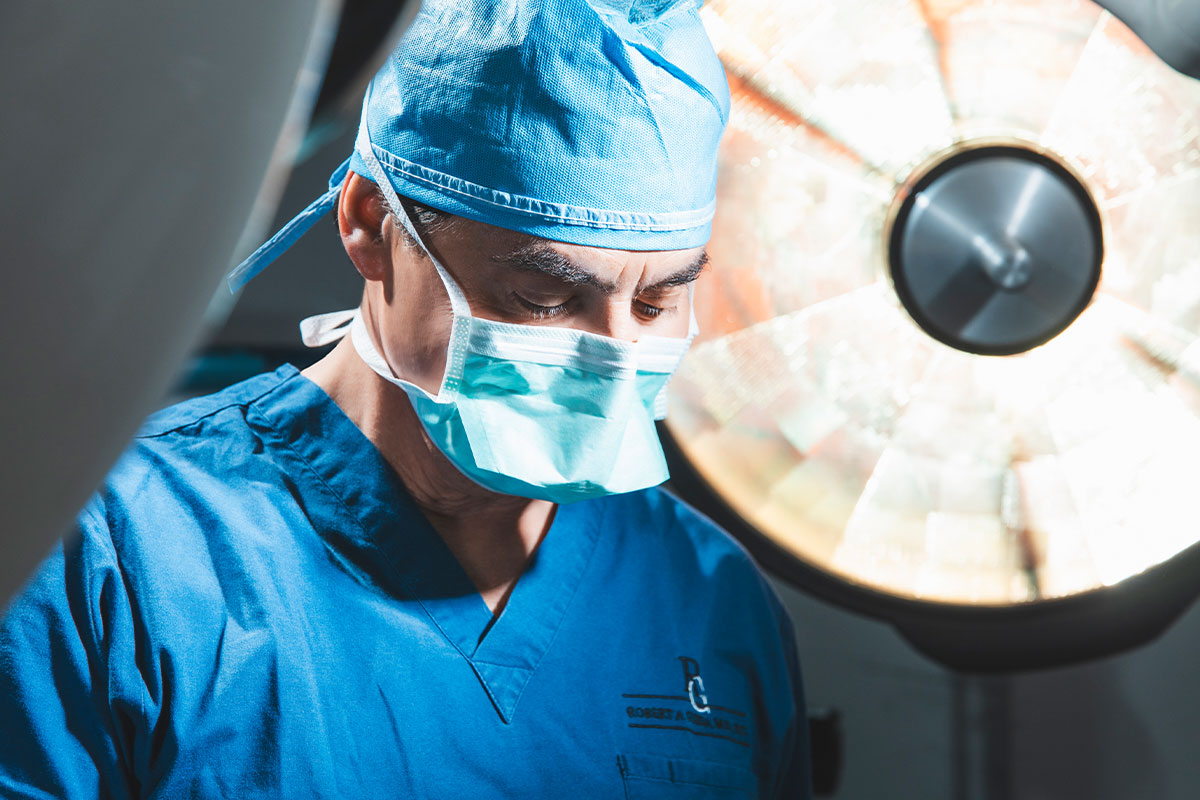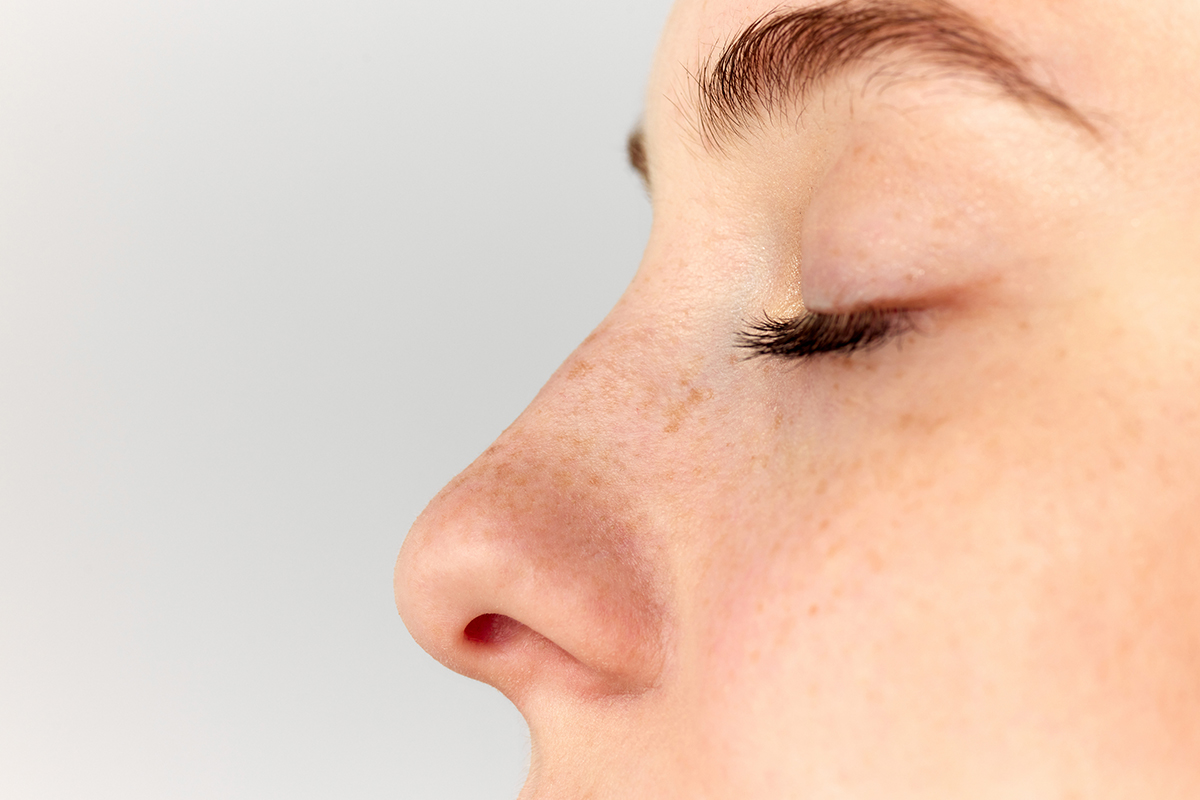Functional rhinoplasty (including septoplasty) is a surgical procedure to improve the functionality of the nose rather than just its aesthetic appearance. Dr. Guida performs functional rhinoplasty in NYC to address issues like breathing difficulties, septal deviations, and structural abnormalities that may hinder proper airflow. Dr. Guida is one of the few surgeons with his own Image Guided Sinus Surgery Fusion machine in the office, which he uses to ensure safe, consistent, and optimal results.
Trust Your Nose
to a Rhinoplasty Expert
When considering a nose job or septoplasty, it is paramount to entrust your nose to the hands of a highly skilled and experienced expert. The intricacies of functional rhinoplasty demand a surgeon who understands the aesthetic aspects and possesses a profound knowledge of the nose’s intricate anatomy and its impact on breathing. Dr. Guida has the skills, training, and experience to perform highly personalized functional rhinoplasties, ensuring consistently optimal results.
Dr. Guida is double board-certified by the American Board of Facial Plastic & Reconstructive Surgery and the American Board of Otolaryngology, which attests to his advanced training and comprehensive understanding of nasal surgery. Moreover, he has trained under some of the leading rhinoplasty experts in the United States. With over 30 years of specialized experience in rhinoplasty and revision rhinoplasty, Dr. Guida has honed his skills to provide patients with optimal functional and aesthetic results.


What Is Functional Rhinoplasty?
Functional rhinoplasty is a surgical procedure performed at our New York City clinic, which addresses and enhances the functional aspects of the nose, focusing on improving breathing and airflow. Unlike cosmetic rhinoplasty, which primarily deals with altering the nose’s appearance, functional rhinoplasty targets structural issues that hinder proper nasal function. Common problems include deviated septums, nasal valve collapse, or other obstructions that lead to congestion, snoring, sleep apnea, or difficulty breathing. By correcting these issues, functional rhinoplasty improves nasal function, enhances overall quality of life, and alleviates associated health problems.
Signs & Symptoms Indicating You May Need Functional Rhinoplasty:
- Chronic nasal congestion or stuffiness that doesn’t respond to non-surgical treatments
- Frequent snoring, especially if it disrupts sleep or causes discomfort to others
- Difficulty breathing through the nose, especially when exercising or sleeping
- Recurrent sinus infections or sinus-related issues
- Sleep apnea or other sleep disturbances linked to nasal obstruction
- Impaired sense of smell or taste related to nasal problems
- Severe nosebleeds and nasal drip
- Dry mouth and/or sinus pressure headaches
Types of Functional Rhinoplasty
Septoplasty
Septoplasty is used to correct a deviated septum. A deviated septum occurs when the thin wall (nasal septum) that separates the nostrils is misaligned, making one nasal passage smaller than the other. This structural abnormality can significantly hinder airflow, causing chronic congestion, difficulty breathing, and snoring. Septoplasty corrects this by straightening and repositioning the septal cartilage, ensuring both nostrils are open and facilitating improved nasal function. This can alleviate breathing difficulties and enhance overall respiratory health.
Nasal Polyp Removal
Nasal Polyp Removal treats chronic nasal obstruction, congestion, and sinus infections caused by polyps. Nasal polyps are soft, non-cancerous growths that can develop within the nasal passages or sinuses, often causing blockages and obstructing airflow. They can lead to persistent nasal congestion, reduced sense of smell, and sinus infections. Functional rhinoplasty can be an effective treatment for nasal polyps when they are obstructing the nasal passages. The surgical removal of these growths during the procedure can restore normal nasal function, improve breathing, and alleviate associated symptoms.
Nasal Valve Repair
Nasal Valve Repair is used to correct or prevent weak, narrow, or collapsed nasal valves, which can lead to difficulty breathing through the nose. When the nasal valves collapse, it can lead to significant airflow obstruction, causing symptoms like nasal congestion, difficulty breathing, and snoring. Functional rhinoplasty can address this issue by reinforcing or reconstructing the nasal valve area using spreader grafts, restoring its strength and stability, and ultimately improving nasal airflow and function.
Turbinectomy
Turbinate surgery is used when enlarged nasal turbinates cause chronic nasal congestion, breathing difficulties, or snoring that does not respond to medication. Turbinates are structures inside the nose responsible for humidifying and filtering inhaled air. When these turbinates become excessively large due to inflammation or other factors, they can obstruct nasal passages, causing chronic congestion, snoring, and difficulty breathing. Functional rhinoplasty in NYC can address enlarged turbinates through turbinectomy, a special technique to remove part of the turbinates, or turbinoplasty, which alters the turbinates to improve airflow. This helps alleviate nasal congestion and enhances overall nasal function.
The Image-Guided Sinus Surgery Fusion Machine
Dr. Guida is one of the few surgeons with an in-office Image-Guided Sinus Surgery Fusion machine. This cutting-edge technology represents a significant advancement in sinus surgery. It combines the precision of image-guided surgery with real-time data, enhancing the accuracy and safety of sinus procedures. This innovative system utilizes high-resolution 3D imaging, typically from a CT scan, to create a detailed map of the patient’s sinus.
During your nasal surgery, this map is superimposed onto the patient’s real-time surgical field, providing Dr. Guida with a precise, live visual guide. This allows him to navigate the intricate sinus passages and perform procedures with accuracy. The Image-Guided Sinus Surgery Fusion machine ensures that surgical interventions are minimally invasive, reducing the risk of complications and enhancing the overall quality of care for patients seeking relief from sinus issues.

What To Expect When Recovering From Functional Rhinoplasty
In the initial days following functional rhinoplasty in NYC, you may experience mild to moderate discomfort, swelling, and bruising around the nose and eyes. This is normal and can be managed with prescribed pain medication and cold compresses. To support a speedy recovery, it’s crucial to follow your surgeon’s post-operative instructions diligently. You’ll likely be advised to avoid strenuous activities, refrain from blowing your nose forcefully, and sleep with your head elevated to minimize swelling.
You should also maintain regular follow-up appointments with your surgeon to monitor your progress. While everyone’s recovery timeline can vary, most individuals can expect noticeable improvements in nasal function and reduced swelling within a few weeks, with final results becoming apparent over several months. As the side effects and swelling dissipate, you can breathe and sleep more comfortably.
Functional Rhinoplasty FAQs
What is the difference between functional rhinoplasty and cosmetic rhinoplasty?
Functional rhinoplasty focuses on improving the functionality of the nose, addressing issues like breathing difficulties, septal deviations, or structural abnormalities. On the other hand, cosmetic rhinoplasty is centered around enhancing the nose’s appearance for aesthetic reasons. Dr. Guida is an expert in septoplasty, ethnic rhinoplasty, revision rhinoplasty, male rhinoplasty, female rhinoplasty, teenage rhinoplasty, and primary rhinoplasty.
How long do the results of functional rhinoplasty last?
The results of a functional nose job are generally long-lasting. However, the outcome can be influenced by factors such as aging or further trauma to the nose.
Does insurance cover a functional nose job?
Yes, insurance often covers a functional rhinoplasty in NYC—such as septoplasty—when it’s medically necessary to correct breathing issues or a deviated septum. Cosmetic enhancements, however, are typically not covered. Always check with your insurance provider and surgeon’s office to confirm coverage and required documentation.
Are there any risks or complications associated with functional rhinoplasty?
Like any surgical procedure, functional rhinoplasty carries some risks, such as infection, bleeding, or anesthesia-related issues. Dr. Guida will discuss potential risks and complications with you during the consultation and provide guidance to minimize them.
Will I still have the same nose appearance after functional rhinoplasty?
The primary goal of functional rhinoplasty is to improve nasal function, but some changes in the nose’s appearance may occur due to structural adjustments. Dr. Guida will discuss the potential aesthetic effects of the procedure during the consultation.

Why Choose Dr. Guida For Functional Rhinoplasty in NYC
Dr. Robert Guida is a board-certified rhinoplasty expert with a career spanning over 30 years. His extensive training and experience have made him a trusted authority in rhinoplasty. Dr. Guida has honed his skills under the guidance of leading rhinoplasty surgeons across the United States. In private practice, he has continued to refine his techniques, incorporating the latest techniques while drawing from decades of experience. Schedule a consultation to learn more about functional rhinoplasty in New York City.